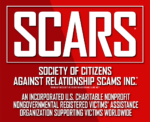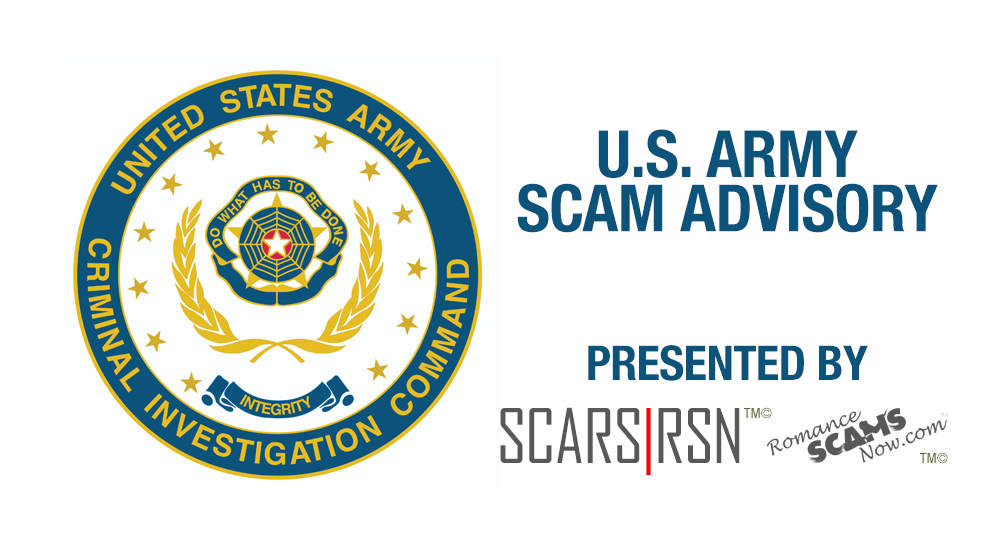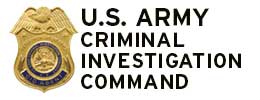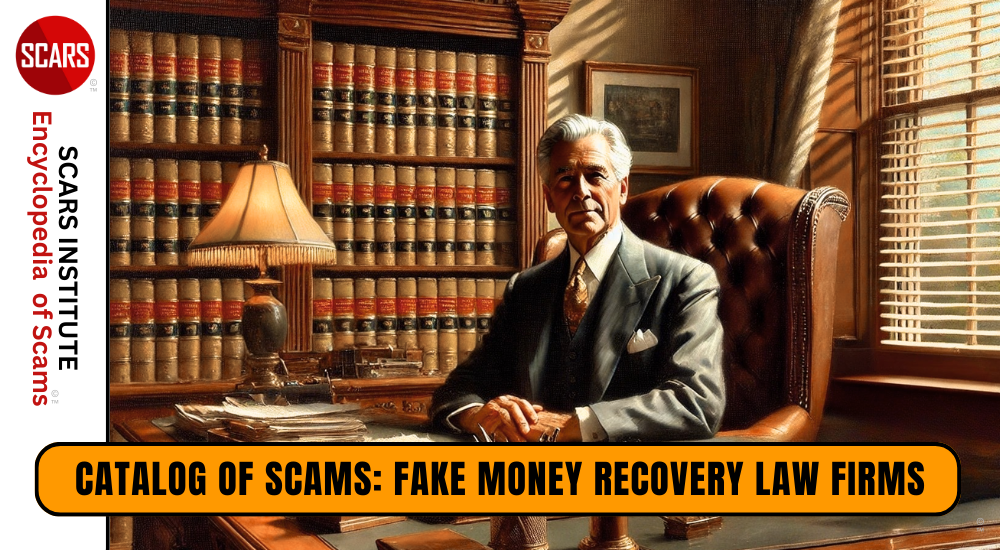
SCARS Institute’s Encyclopedia of Scams™ Published Continuously for 25 Years

SCARS™ Special Report: U.S. Army Warning: Fake Soldiers
Army CID is warning anyone who is involved in online dating to proceed with caution when corresponding with persons claiming to be U.S. Soldiers currently serving in Afghanistan or elsewhere.
The following has been reprinted from the United States Army Criminal Investigation Command
Online Romance Scam Information
Army CID is warning anyone who is involved in online dating to proceed with caution when corresponding with persons claiming to be U.S. Soldiers currently serving in Afghanistan or elsewhere.
Army CID receives hundreds of allegations a month from victims who state they got involved in an online relationship with someone, on a legitimate dating website or other social media website, who claims to be a U.S. Soldier. The “Soldier” then begins asking for money for various false, service-related needs such as transportation costs, communication fees, marriage, processing and medical fees. Victims of these online scams have lost tens of thousands of dollars, with a very low possibility of recovery.
The U.S. has established numerous task force organizations to deal with this growing epidemic; unfortunately, many times the people committing these scams are from African countries using untraceable email addresses, routing accounts through numerous locations around the world and utilizing pay per hour Internet cyber cafes, which often times maintain no accountability of use.
Read the Joint Service Sextortion Brochure for more information and see examples of fake documents used by scammers.
You can also learn more about identity theft, romance scams, sextortion and online impostors at the U.S. Army’s Social Media Resources site.
If you feel you have been scammed by a person claiming to be a U.S. Army Soldier, contact the Federal Trade Commission (FTC) and the Internet Crime Complaint Center (IC3).
For more on these fraudulent acts, read the announcements released by Army CID:
U.S. Army CID Warn Citizens to Be Vigilant Against Internet, Digital Scammers
With National Spotlight on Internet Romance-Type Scams, Army CID Makes Additional Attempts to Warn Unsuspecting Victims
U.S. Army CID Pleads with Public, Warns Against Romance Scams
CID warns Army community about social media impersonation of Soldier accounts
What to look for
- DO NOT SEND MONEY! Be extremely suspicious if you are asked for money for transportation costs, communication fees or marriage processing and medical fees via Western Union.
- If you do start an Internet-based relationship with someone, check them out, research what they are telling you with someone who would know, such as a current or former service member.
- Be very suspicious if you never get to actually speak with the person on the phone or are told you cannot write or receive letters in the mail. Servicemen and women serving overseas will often have an APO or FPO mailing address. Internet or not, service members always appreciate a letter in the mail.
- Many of the negative claims made about the military and the supposed lack of support and services provided to troops overseas are far from reality – check the facts.
- Be very suspicious if you are asked to send money or ship property to a third party or company. Often times the company exists, but has no idea or is not a part of the scam.
- Be very suspicious if the person you are corresponding with wants you to mail anything to an African country.
- Be aware of common spelling, grammatical or language errors in the emails.
- Be very suspicious of someone you have never met and who pledges their love at warp speed.
“Red Flags” – some of the words/phrases used by scammers
Saying they are on a Peace Keeping Mission, looking for an honest woman, parents deceased, wife deceased, child being cared for by nanny or other guardian, profess their love almost immediately, refer to you as “my love,” “my darling” or any other affectionate term almost immediately, telling you they cannot wait to be with you, telling you they cannot talk on the phone or via webcam due to security reasons, or telling you they are sending you something (money, jewelry) through a diplomat. Finally, they claim to be a U.S. Army Soldier; however, their English and grammar do not match that of someone born and raised in the United States.
Here are answers to some of the most common types of scams:
- 1. Soldiers and their loved ones are not charged money so that the Soldier can go on leave.
- 2. No one is required to request leave on behalf of a Soldier.
- 3. A general officer will not correspond with you on behalf of a Soldier planning to take leave.
- 4. A general officer will not be a member of an internet dating site.
- 5. Soldiers are not charged money or taxes to secure communications or leave.
- 6. Soldiers do not need permission to get married.
- 7. Soldiers do not have to pay for early retirement.
- 8. Soldiers have medical insurance for themselves and their immediate family members (spouse and/or children), which pays for their medical costs when treated at health care facilities worldwide – family and friends do not need to pay their medical expenses.
- 9. Military aircraft are not used to transport Privately Owned Vehicles.
- 10. Army financial offices are not used to help Soldiers buy or sell items of any kind.
- 11. Soldiers deployed to combat zones do not need to solicit money from the public to feed or house their troops.
- 12. Deployed Soldiers do not find large sums of money and do not need your help to get that money out of the country.
Where to go for help
Report the theft to the Internet Crime Complaint Center (IC3) (FBI-NW3C Partnership). Online: http://www.ic3.gov/default.aspx
Report the theft to the Federal Trade Commission. Your report helps law enforcement officials across the United States in their investigations. Online: http://www.ftc.gov/idtheft
By phone: 1-877-ID-THEFT (438-4338) or TTY, 1-866-653-4261
By mail: Identity Theft Clearinghouse, Federal Trade Commission, Washington, DC 20580
Report the fraud to the Federal Trade Commission on Nigerian Scams. Email: spam@uce.gov.
Articles and useful links regarding Online Romance Scams
- Brown County Browser: Don’t fall for veterans romance scams
- Fake US Soldiers Robbing Women Online
- How a billion-dollar Internet scam is breaking hearts and bank accounts
- “Prince Charming” Behind Bars: Nigerian Romance Scammer Nets 27-Year Prison Sentence
- Love a man in uniform? Online dating scammers hope so
- Love me don’t: the West African online scam using U.S. Soldiers
- Australian grandmother on drug ice charges in Malaysia: Maria Elvira Pinto Exposto may be victim of a military romance scam
- U.S. Embassy Accra-Ghana
- RomanceScamsNow.com
- Society of Citizens Against Romance Scams [SCARS]
– – –

SCARS™ Team
A SCARS Division
Miami Florida U.S.A.
TAGS: – tags
END
– – –
Tell us about your experiences with Romance Scammers in our Scams Discussion Forum on Facebook »
– – –
FAQ: How Do You Properly Report Scammers?
It is essential that law enforcement knows about scams & scammers, even though there is nothing (in most cases) that they can do.
Always report scams involving money lost or where you received money to:
- Local Police – ask them to take an “informational” police report – say you need it for your insurance
- Your National Police or FBI (www.IC3.gov »)
- The SCARS|CDN™ Cybercriminal Data Network – Worldwide Reporting Network HERE » or on www.Anyscam.com »
This helps your government understand the problem, and allows law enforcement to add scammers on watch lists worldwide.
– – –
Visit our NEW Main SCARS Facebook page for much more information about scams and online crime: www.facebook.com/SCARS.News.And.Information »
To learn more about SCARS visit www.AgainstScams.org
Please be sure to report all scammers HERE » or on www.Anyscam.com »
All original content is Copyright © 1991 – 2020 SCARS All Rights Reserved Worldwide & Webwide – SCARS/Romance Scams Now & SCARS/Society of Citizens Against Relationship Scams are all trademarks of Society of Citizens Against Relationship Scams Incorporated (formerly the Society of Citizens Against Romance Scams)
Legal Notices:
All original content is Copyright © 1991 – 2020 SCARS All Rights Reserved Worldwide & Webwide. Third-party copyrights acknowledge.
SCARS, RSN, Romance Scams Now, SCARS|WORLDWIDE, SCARS|GLOBAL, SCARS, Society of Citizens Against Relationship Scams, Society of Citizens Against Romance Scams, SCARS|ANYSCAM, Project Anyscam, Anyscam, SCARS|GOFCH, GOFCH, SCARS|CHINA, SCARS|CDN, SCARS|UK, SCARS Cybercriminal Data Network, Cobalt Alert, Scam Victims Support Group, are all trademarks of Society of Citizens Against Relationship Scams Incorporated.
Contact the law firm for the Society of Citizens Against Relationship Scams Incorporated by email at legal@AgainstScams.org
-/ 30 /-
What do you think about this?
Please share your thoughts in a comment below!
Table of Contents
- Online Romance Scam Information
- What to look for
- “Red Flags” – some of the words/phrases used by scammers
- Where to go for help
- Articles and useful links regarding Online Romance Scams
- Tell us about your experiences with Romance Scammers in our Scams Discussion Forum on Facebook »
- Please be sure to report all scammers HERE » or on www.Anyscam.com »
LEAVE A COMMENT?
Recent Comments
On Other Articles
- Arwyn Lautenschlager on Love Bombing And How Romance Scam Victims Are Forced To Feel: “I was love bombed to the point that I would do just about anything for the scammer(s). I was told…” Feb 11, 14:24
- on Dani Daniels (Kira Lee Orsag): Another Scammer’s Favorite: “You provide a valuable service! I wish more people knew about it!” Feb 10, 15:05
- on Danielle Delaunay/Danielle Genevieve – Stolen Identity/Stolen Photos – Impersonation Victim UPDATED 2024: “We highly recommend that you simply turn away form the scam and scammers, and focus on the development of a…” Feb 4, 19:47
- on The Art Of Deception: The Fundamental Principals Of Successful Deceptions – 2024: “I experienced many of the deceptive tactics that romance scammers use. I was told various stories of hardship and why…” Feb 4, 15:27
- on Danielle Delaunay/Danielle Genevieve – Stolen Identity/Stolen Photos – Impersonation Victim UPDATED 2024: “Yes, I’m in that exact situation also. “Danielle” has seriously scammed me for 3 years now. “She” (he) doesn’t know…” Feb 4, 14:58
- on An Essay on Justice and Money Recovery – 2026: “you are so right I accidentally clicked on online justice I signed an agreement for 12k upfront but cd only…” Feb 3, 08:16
- on The SCARS Institute Top 50 Celebrity Impersonation Scams – 2025: “Quora has had visits from scammers pretending to be Keanu Reeves and Paul McCartney in 2025 and 2026.” Jan 27, 17:45
- on Scam Victims Should Limit Their Exposure To Scam News & Scammer Photos: “I used to look at scammers photos all the time; however, I don’t feel the need to do it anymore.…” Jan 26, 23:19
- on After A Scam, No One Can Tell You How You Will React: “This article was very informative, my scams happened 5 years ago; however, l do remember several of those emotions and/or…” Jan 23, 17:17
- on Situational Awareness and How Trauma Makes Scam Victims Less Safe – 2024: “I need to be more observant and I am practicing situational awareness. I’m saving this article to remind me of…” Jan 21, 22:55
ARTICLE META
Important Information for New Scam Victims
- Please visit www.ScamVictimsSupport.org – a SCARS Website for New Scam Victims & Sextortion Victims
- Enroll in FREE SCARS Scam Survivor’s School now at www.SCARSeducation.org
- Please visit www.ScamPsychology.org – to more fully understand the psychological concepts involved in scams and scam victim recovery
If you are looking for local trauma counselors please visit counseling.AgainstScams.org or join SCARS for our counseling/therapy benefit: membership.AgainstScams.org
If you need to speak with someone now, you can dial 988 or find phone numbers for crisis hotlines all around the world here: www.opencounseling.com/suicide-hotlines
A Note About Labeling!
We often use the term ‘scam victim’ in our articles, but this is a convenience to help those searching for information in search engines like Google. It is just a convenience and has no deeper meaning. If you have come through such an experience, YOU are a Survivor! It was not your fault. You are not alone! Axios!
A Question of Trust
At the SCARS Institute, we invite you to do your own research on the topics we speak about and publish, Our team investigates the subject being discussed, especially when it comes to understanding the scam victims-survivors experience. You can do Google searches but in many cases, you will have to wade through scientific papers and studies. However, remember that biases and perspectives matter and influence the outcome. Regardless, we encourage you to explore these topics as thoroughly as you can for your own awareness.
Statement About Victim Blaming
SCARS Institute articles examine different aspects of the scam victim experience, as well as those who may have been secondary victims. This work focuses on understanding victimization through the science of victimology, including common psychological and behavioral responses. The purpose is to help victims and survivors understand why these crimes occurred, reduce shame and self-blame, strengthen recovery programs and victim opportunities, and lower the risk of future victimization.
At times, these discussions may sound uncomfortable, overwhelming, or may be mistaken for blame. They are not. Scam victims are never blamed. Our goal is to explain the mechanisms of deception and the human responses that scammers exploit, and the processes that occur after the scam ends, so victims can better understand what happened to them and why it felt convincing at the time, and what the path looks like going forward.
Articles that address the psychology, neurology, physiology, and other characteristics of scams and the victim experience recognize that all people share cognitive and emotional traits that can be manipulated under the right conditions. These characteristics are not flaws. They are normal human functions that criminals deliberately exploit. Victims typically have little awareness of these mechanisms while a scam is unfolding and a very limited ability to control them. Awareness often comes only after the harm has occurred.
By explaining these processes, these articles help victims make sense of their experiences, understand common post-scam reactions, and identify ways to protect themselves moving forward. This knowledge supports recovery by replacing confusion and self-blame with clarity, context, and self-compassion.
Additional educational material on these topics is available at ScamPsychology.org – ScamsNOW.com and other SCARS Institute websites.
Psychology Disclaimer:
All articles about psychology and the human brain on this website are for information & education only
The information provided in this article is intended for educational and self-help purposes only and should not be construed as a substitute for professional therapy or counseling.
While any self-help techniques outlined herein may be beneficial for scam victims seeking to recover from their experience and move towards recovery, it is important to consult with a qualified mental health professional before initiating any course of action. Each individual’s experience and needs are unique, and what works for one person may not be suitable for another.
Additionally, any approach may not be appropriate for individuals with certain pre-existing mental health conditions or trauma histories. It is advisable to seek guidance from a licensed therapist or counselor who can provide personalized support, guidance, and treatment tailored to your specific needs.
If you are experiencing significant distress or emotional difficulties related to a scam or other traumatic event, please consult your doctor or mental health provider for appropriate care and support.
Also read our SCARS Institute Statement about Professional Care for Scam Victims – click here to go to our ScamsNOW.com website.






























Thank you for your comment. You may receive an email to follow up. We never share your data with marketers.